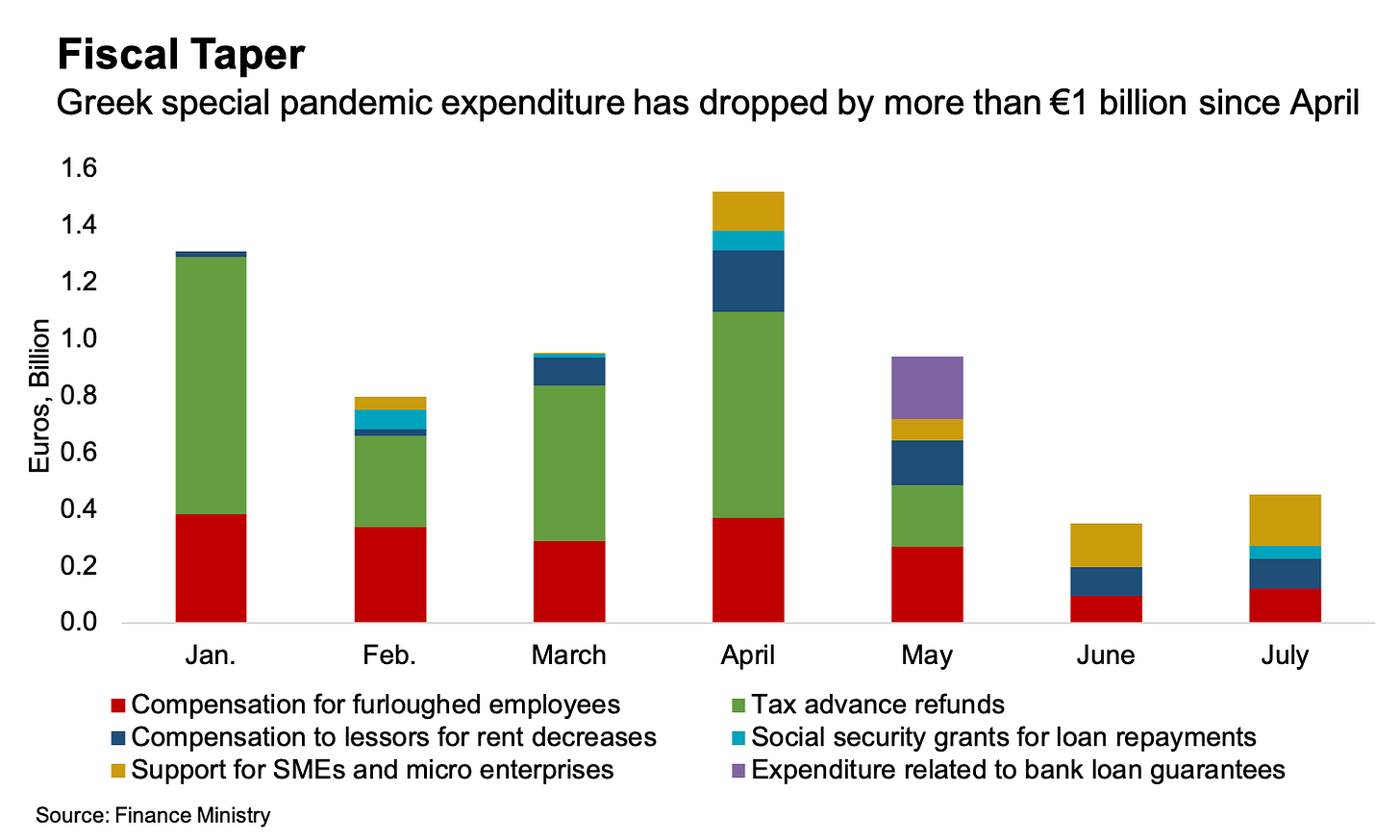Macro roundup: Budget stabilisation
Tapering of support measures has stemmed growth of Greece's primary deficit
With indicators pointing to a strong rebound for Greece’s economy from the second quarter onwards, there will be sighs of relief in the Finance Ministry at the budget’s stabilising trend in the last few months.
The preliminary budget execution bulletin for July this week showed that the central government ran a small primary budget surplus of 16 million euros — not much, but the first monthly surplus in almost a year, and only the second one since the outbreak of the pandemic.
The primary deficit for the first seven months of the year, at 9.08 billion euros, is still 1.85 billion euros wider than forecast in the 2021 budget. But at the start of the summer, the ministry threw out those targets in its monthly budget execution bulletins and replaced them with more recent forecasts from the medium-term fiscal strategy.
For the whole of 2021, the target has been revised from a deficit of 10.3 billion euros to 13.4 billion euros.
This switch is nice for the government presentationally, because instead of writing headlines about budgets, newspapers now run stories about how the budget is beating its target. Against the MTFS forecast, the year-to-date primary deficit was 526 million euros smaller than forecast in July.
With revenue still coming in 650 million euros below the new target, the stabilisation of the deficit is largely attributable to a drop in spending compared with the start of the year. More specifically, we’re beginning to see a tapering of pandemic-related expenses, which hit a monthly peak of 1.52 billion euros in April and dropped to just 351 million euros two months later.
So far this year the government has spent 6.33 billion euros on special pandemic-related measures, with 43 percent of that coming through tax advance refunds for businesses and 30 percent coming from wage subsidies for workers under contract suspension.
With the first of these programmes now ended, and the second reduced after the second lockdown ended, there has been a pickup in support measures for SMEs in the past couple of months — but overall the government is spending less.
Other data
The current account deficit narrowed slightly in June compared with a year earlier, to 1.34 billion euros from 1.4 billion euros. Imports have been continuing their strong upward trend of this year, but exports are also growing. The month saw some recovery in travel receipts. They stood at 708 million euros for the month, compared with just 83 million euros in June 2020. Reports suggest that tourism has performed strongly in July and August, with the government’s goal of achieving half of 2019’s revenue starting to look achievable.
The unemployment rate fell to 15 percent in June from 15.8 percent in May. Meanwhile, according to Labour Ministry data, there were 24,395 more people hired than left their jobs in July. Much of the positive employment balance was due to seasonal hires in hotels and restaurants.
Industrial production increased 8.8 percent in June from a year earlier. The increase in manufacturing was 6.8 percent.
The EU-harmonized inflation rate crept up to 0.7 percent in July from 0.6 percent the month before. Using the national measure, the rate rose to 1.4 percent from 1 percent in May.
If you’re enjoying this newsletter, consider sharing it with others who might also like it.
Next week’s key data
Wednesday, Aug. 25:
January to July budget execution, final figures (Finance Ministry)
Thursday, Aug. 26:
July bank lending and deposits (Bank of Greece)
I’d love to get your thoughts and feedback, either in the comments, on Twitter or by reply if you received the newsletter by email. If you’re not subscribed yet, consider doing so now.



